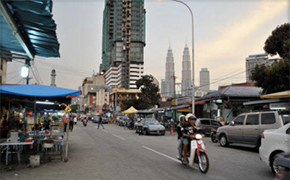Instructor Insights pages are part of the OCW Educator initiative, which seeks to enhance the value of OCW for educators.
Course Overview
The Malaysia Sustainable Cities Practicum (MSCP) is an intensive field-based course that brings 15 graduate students to Malaysia to learn about and analyze sustainable city development in five cities in Malaysia.
In the first part of the Practicum, which happens in the fall each year, selected graduate students in the Department of Urban Studies and Planning participate in an online self-study during which they learn about Malaysian culture, history, politics, ecology, geography, planning, and economics. They also learn about reflective practice and journaling. During the January Independent Activities Period, students and faculty travel to Malaysia for two weeks to conduct field-based research in conjunction with student and faculty colleagues at Universiti Teknologi Malaysia.
Each year, MSCP visiting international scholars join the IAP Practicum as part of the teaching faculty. In the spring, they come to MIT and work with MIT doctoral students and faculty to prepare research papers to submit to peer-reviewed journals (in their separate fields) and produce teaching videos for global distribution.
The Practicum concludes with a one-week group session at MIT that generates a Research Agenda spelling out suggested research topics for the next year's cohort of international visiting scholars.
Course Outcomes
Course Goals for Students
- Understand the constraints on, and opportunities for, sustainable development in Malaysia
- Provide feedback to various development agencies
- Identify projects or policy-making efforts that can serve as the focus of the research of future visiting international scholars
Students in the Practicum are helping to identify the ways in which cities in Malaysia are striving to enhance sustainability.
— Lawrence Susskind
In the following pages, Lawrence Susskind describes various aspects of how he teaches 11.384 Malaysia Sustainable Cities Practicum.
Curriculum Information
Prerequisites
Students must apply and be accepted into the Malaysia Sustainable Cities Practicum.
Requirements Satisfied
None
Offered
The Practicum has been offered every year since 2014.
Student Information

Breakdown by Year
Mostly graduate students
Breakdown by Major
Mostly urban studies and planning
How Student Time Was Spent
Fall: Pre-Travel Online Tutorial and Workshop
- Students complete a mandatory self-paced online tutorial that prepares them to interact with citizens and public officials in Malaysia. The tutorial covers Malaysian culture, history, politics, geography, ecology, planning, and economics.
- Students write three short response papers based on the assigned readings and are encouraged to integrate any additional readings on Malaysia beyond what is assigned.
- Practicum students also participate in a short reflective practice workshop facilitated by the Community Innovator’s Lab (CoLab) in DUSP to learn about the reflective practice and journaling tools they are expected to use throughout the Practicum.
January: Travel to Malaysia
- Under the direction of the MIT Faculty Committee for the program, students travel from Boston to Malaysia. They spend approximately two full weeks in Malaysia over the January Independent Activities Period (IAP).
- During this time they visit multiple cities, engage in group reflection, and conduct field-based research in conjunction with our colleagues at the Universiti Teknologi Malaysia (UTM).
Spring: Report Writing
- The final portion of the Practicum concludes with a group report-writing session during the last week of IAP for which all students must be present. Students produce a Research Agenda for the coming year.
Course Team Roles
DUSP and UTM Faculty
The IAP Practicum involves five DUSP faculty who work in different fields and reflect different backgrounds (law, planning, urban design, political science and international development). The UTM faculty come from multiple fields as well. These faculty members travel with the MIT Practicum students to different cities in Malaysia, helping them identify possible research questions that ought to be given priority. This involves meeting with a wide range of governmental and non-governmental groups.
Doctoral Teaching Assistants
There are three doctoral teaching assistants for the Practicum who not only oversee the online preparatory course, but travel with students during IAP and work with the international scholars from the time they arrive at UTM for their end of August orientation until the time they leave MIT at the end of May. The MIT PHD teaching assistants are part of the MSCP program the entire time they are at MIT.
Community Innovator’s Lab (CoLab) Staff
In preparation for the Practicum, students participate in two evening discussions with staff from the Community Innovator’s Lab (CoLab) in DUSP to learn about reflective practice and video journaling. MIT students in the Practicum prepare both written and video journals that CoLab continues to select as part of its responsibility of encouraging students to become more reflective practitioners.

